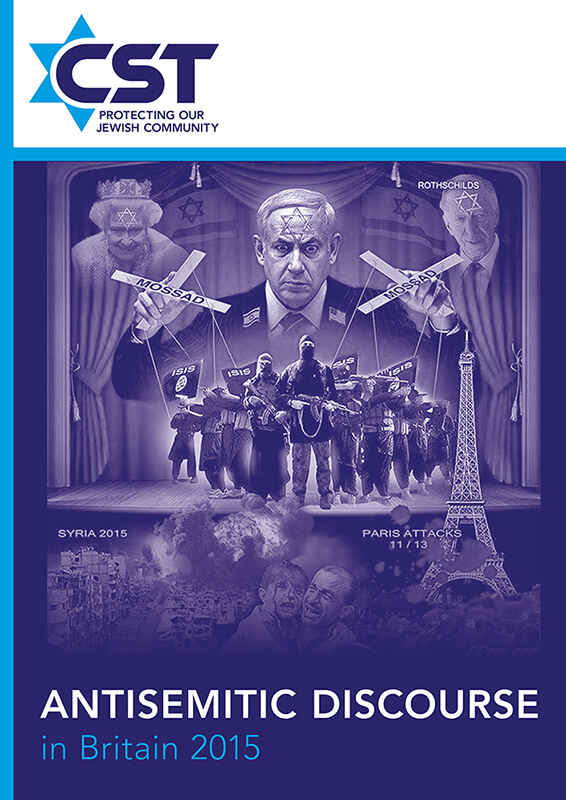CST Blog
Antisemitic Discourse Report 2015
23 December 2016
Today sees the publication of CST's Antisemitic Discourse Report 2015 (see full PDF here). This is CST final report of the year. It examines the use of antisemitic language and images in mainstream politics and media, including social media. The report also covers public discussion and debate about antisemitism, including condemnations of antisemitism by mainstream figures.

The Executive Summary is shown below:
Explicit antisemitism against Jews per se, simply for their being Jewish, is rarely voiced in British public life, or in mainstream political and media discourse.
The relative absence of explicit antisemitism in mainstream discourse did not, however, make the subject of antisemitism unimportant in 2015. Indeed, the opposite was the case.
The year began with terrorist attacks in Paris (January) and Copenhagen (February), which included Jewish targets. Next was a UK General Election (May) in which Ed Miliband, a Jewish MP, led the Labour Party. Following which a longstanding critic of Israel, Jeremy Corbyn MP, became Labour leader (September).
Each of the above events provided significant insight into the nature of contemporary antisemitism, and analysis of these events comprise the bulk of this 2015 CST Antisemitic Discourse Report. They give a deeper understanding of the apparent contradiction between a relative scarcity of explicit antisemitism and persisting, or indeed worsening, concerns about antisemitism.
Jeremy Corbyn MP’s successful campaign for the leadership of the Labour Party saw one of the most public and sustained discussions of antisemitism in recent memory. The mainstream Jewish concerns directed against Corbyn were strikingly similar to those long expressed about the anti-Israel and antiZionist left in general, such as its dismissals and misrepresentations of mainstream Jewish concerns about antisemitism, and its allying with pro-Hizbollah and pro-Hamas Islamists.
The mainly negative Jewish reaction to Corbyn’s victory showed the depth of Jewish fears about anti-Israel politics, including what role antisemitism is believed to play in its motivations, content and impacts. This is despite most Jews apparently perceiving Jeremy Corbyn himself to not be a Jew-hater.
Corbyn’s victory threatened to rupture the long relationship between British Jews and the Labour Party. It was the first time in decades that the risk of estrangement arose between the mainstream of the Jewish community and the leadership of either the Labour or Conservative parties.
There was a welcome relative absence of antisemitism in the General Election campaign, despite Ed Miliband MP being the Labour leader. Concerns were raised about whether some of the descriptions and headlines about Miliband were in any way antisemitic, but such interpretations were impossible to prove and Miliband himself avoided any such claims. Polling showed that UKIP voters were those most bothered by Miliband’s Jewish identity, with Labour voters relatively unconcerned, whilst one-third of voters were unaware of it.
The absence of open antisemitism against Miliband suggests that explicit antisemitism is simply unacceptable in parliamentary politics and mainstream media. Nevertheless, the powerful resonance of pejoratively used terms such as “north London” and a photograph of him eating bacon in a clumsy manner, suggested that Miliband’s Jewish background might play a subtle role in derisive portrayals of him as ‘not one of us’. Thus, the absence of explicit antisemitism does not mean that its presence in some form can be discounted completely as a factor in how prominent Jewish individuals are portrayed.
The Paris and Copenhagen terrorist attacks caused UK Jews to fear that they may be similarly targeted. In response, the Government provided over £10 million of further funding for security measures (primarily commercial security guards), to be administered by CST on behalf of the Jewish community. A broad range of political leaders spoke strongly in defence of Jewish communities. The latest report of the AllParty Parliamentary Inquiry into Antisemitism, released in February 2015, added further practical and rhetorical weight to this crossparty opposition to antisemitism.
These actions against antisemitism were deeply appreciated by UK Jews, but the underlying fear of terrorism and wider antisemitism remained.
This CST Antisemitic Discourse Report shows that the targeting of Jews in Paris and Copenhagen seemed to matter less to the media and general public, than the attacks on other targets at the same time. Much of the British anti-racist left warned against a potential anti-Muslim backlash, whilst saying nothing about Jews being under attack from Jihadist terrorists. The attacks also saw further spreading of the claim that ISIS / Da’esh is a secret Mossad, or Israeli, or Zionist conspiracy against Muslims.
Read More

Antisemitic Incidents Report January-June 2025
6 August 2025

Love since 7 October
14 February 2025

Antisemitic Incidents Report 2024
12 February 2025